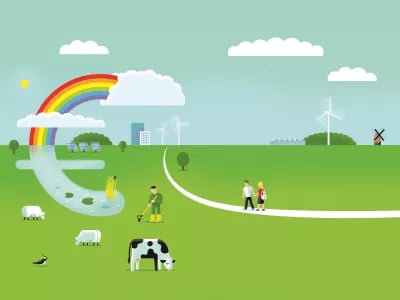Less than a decade ago, businesses would pride themselves on their ‘corporate social responsibility’ credentials. But with CSR having become an integral part of any company’s public profile, a growing number of businesses are looking to raise the bar by developing business models that combine market returns with a positive social and/or environmental impact. We explore whether social enterprise is the future of business – and if so, what that future might look like.
The Eindhoven-based entrepreneur and scientist Jalila Essaïdi recently won the Global Change Award presented by the H&M Foundation for her ‘Mestic’ collection, consisting of twelve dresses, all made from cow manure. Essaïdi intends to invest the $150,000 prize money she received in the further development of her company, Inspidere BV.
Harry Hummels, a lecturer in Social Entrepreneurship at the Utrecht University School of Economics, regards Essaïdi as emblematic of a new type of entrepreneur: people with bold and radical new ideas who can create the type of innovative business models that contribute to solving social problems. Hummels: ‘Jalila doesn’t view manure as simply an overhead for cattle farmers, but as a way for them to generate extra revenues, with the obvious advantage being that it’s also better for the environment. And while her project is still at a nascent stage, she’s a talented enough entrepreneur to turn it into a success. I think we’ll be seeing the first commercial manure production on an industrial scale in just a few years from now.’
Hummels describes the social enterprise phenomenon as “the innovative use of operating assets for the sustainable production and distribution of goods and services for the purpose of meeting a public need or solving a problem in society”. He says: ‘That last bit is essential, as not all services that meet a human need also cater to a basic social need. Some of those needs are essentially universal – clean water, clean air, healthy and sufficient food, the opportunity for education and personal development, and so on – while others vary by country, depending on the type of society. In the Netherlands, for example, workforce participation is regarded as a basic social need, but that’s not the case in many African counties. I like to define “social needs” as products or services without which people wouldn’t be able to live a decent life.’
The number of social enterprises is growing exponentially, worldwide and in the Netherlands too. A 2016 report published by McKinsey titled ‘Scaling the impact of the social enterprise sector’ reveals that the number of entrepreneurs who created a business for a social purpose has increased by more than 70 percent in the Netherlands. Another 25,000 jobs have been added to the sector, while revenues have also been increasing steadily: from €2 billion in 2010 to €3.5 billion in 2015.
Four qualities
This apparent shift in the industry has also been noted by Dutch journalist Nadine Maarhuis, who last summer explored the emergence of the ‘triple bottom line’ (People, Planet and Profit) in Dutch business for Follow the Money, a platform for investigative journalism. Drawing on a large number of interviews, she concluded that there are four qualities that these types of ‘new’ entrepreneurs all share. In a nutshell:
1. They don’t engage in ‘greenwashing’
For authentic social entrepreneurs, terms such as ‘meaningful’, ‘impact’, ‘green’ and ‘sustainable’ are not merely buzzwords, marketing gimmicks or “clickbait created by millennials who can’t find a proper job”, as Maarhuis puts it. Their social enterprise is not some Friday-afternoon pastime, and they don’t abandon their ethical principles if it means they can turn a profit.
2. They use a large portion of the profit to increase their impact
One attribute of social enterprise is that the financial goals are secondary to the objective of increasing social or environmental impact. This means the bulk of the profit is invested back into the company. Any profits allocated to shareholders therefore remain ‘limited’.
3. They are transparent about what they do and how they do it
Social entrepreneurs are open about their mission and how they intend to achieve it, as well as about their internal business operations and their financial business model.
4. They are unafraid to share innovations or grow decentrally
Social entrepreneurs look toward the dot on the horizon. This means they are relationship-driven and promote competition: the more companies decide to tackle a certain social problem, the better it will be for everyone. The future will be about sharing knowledge and resources rather than centring on ownership.
While Hummels agrees with these points for the most part, he feels a fifth quality is at least as pertinent: there should be a genuine entrepreneurial drive: ‘Good intentions, no matter how noble they might be, are only going to get you so far. If you can’t survive without permanent government funding, your business doesn’t qualify as a social enterprise. You need to make an impact, but you also need to generate revenues.’













